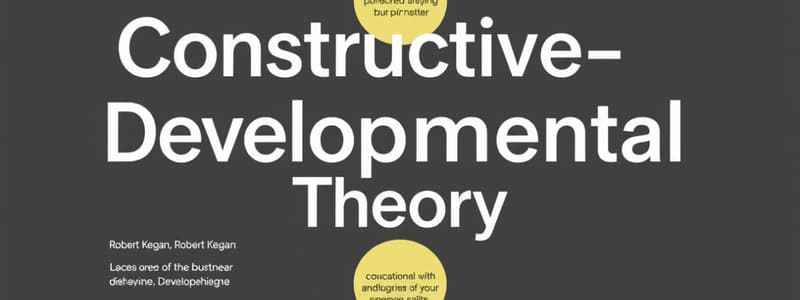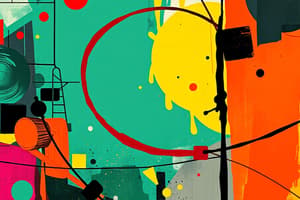Podcast
Questions and Answers
What does the shift from Subject to Object primarily signify in Kegan's theory?
What does the shift from Subject to Object primarily signify in Kegan's theory?
- The abandonment of prior knowledge and experiences
- Greater self-awareness and control over meaning-making (correct)
- An innate understanding of human complexity
- A passive acceptance of external realities
How many orders of mind are identified in Kegan's theory?
How many orders of mind are identified in Kegan's theory?
- Seven
- Three
- Ten
- Five (correct)
What is a key aspect to remember regarding Kegan’s theory and its hierarchical nature?
What is a key aspect to remember regarding Kegan’s theory and its hierarchical nature?
- Traversal through the orders depends on personal circumstances and choices (correct)
- All individuals develop at the same pace
- Development is a competitive race towards superiority
- The higher orders are universally better than the lower orders
What does 'self-complexity' in Kegan's theory primarily deal with?
What does 'self-complexity' in Kegan's theory primarily deal with?
What is a potential downside of the transformation described in Kegan's theory?
What is a potential downside of the transformation described in Kegan's theory?
Why is Kegan's model not simply hierarchical?
Why is Kegan's model not simply hierarchical?
Which of the following is NOT a characteristic of Kegan's theory?
Which of the following is NOT a characteristic of Kegan's theory?
How does Kegan view the movement through the orders of mind?
How does Kegan view the movement through the orders of mind?
What is a key aspect of Kegan's Constructive-Developmental Theory?
What is a key aspect of Kegan's Constructive-Developmental Theory?
How many distinct stages does Kegan propose in his theory of adult development?
How many distinct stages does Kegan propose in his theory of adult development?
What differentiates transformation from simple learning according to Kegan?
What differentiates transformation from simple learning according to Kegan?
What does Kegan mean by 'seeing shades of grey'?
What does Kegan mean by 'seeing shades of grey'?
Why is understanding developmental capacity important for those working with adults?
Why is understanding developmental capacity important for those working with adults?
What is one characteristic of adults at different developmental stages according to Kegan?
What is one characteristic of adults at different developmental stages according to Kegan?
What concept underlies the development of Kegan's theory?
What concept underlies the development of Kegan's theory?
In Kegan's view, how is 'transformation' most accurately described?
In Kegan's view, how is 'transformation' most accurately described?
What characteristic defines the transition from the Third to the Fourth order of meaning-making?
What characteristic defines the transition from the Third to the Fourth order of meaning-making?
What emotional conflict may arise for individuals at the Transitional stage?
What emotional conflict may arise for individuals at the Transitional stage?
Which of the following describes a reaction of individuals moving fully into the Fourth order?
Which of the following describes a reaction of individuals moving fully into the Fourth order?
How might a person in the Transitional state interpret a disagreement with a previously accepted theory?
How might a person in the Transitional state interpret a disagreement with a previously accepted theory?
What challenge faces individuals who have almost entirely transitioned to the Fourth order?
What challenge faces individuals who have almost entirely transitioned to the Fourth order?
What is a potential consequence of someone fully engaging in the Fourth order?
What is a potential consequence of someone fully engaging in the Fourth order?
What does it mean for meaning-making systems to 'coexist peacefully'?
What does it mean for meaning-making systems to 'coexist peacefully'?
Why might individuals at the Transitional stage feel uncertain?
Why might individuals at the Transitional stage feel uncertain?
What is the primary achievement of individuals at the Fourth order compared to the Third order?
What is the primary achievement of individuals at the Fourth order compared to the Third order?
How does the relationship with previously held ideologies change from Third to Fourth order?
How does the relationship with previously held ideologies change from Third to Fourth order?
Which statement best describes the perception of a Fourth order individual by peers?
Which statement best describes the perception of a Fourth order individual by peers?
What internal conflict might a Fourth order teacher experience?
What internal conflict might a Fourth order teacher experience?
In the context of personal growth, what distinguishes Fourth order adults from those at the Third order?
In the context of personal growth, what distinguishes Fourth order adults from those at the Third order?
What does the term 'self-authored goal' imply for a Fourth order individual?
What does the term 'self-authored goal' imply for a Fourth order individual?
What is a characteristic of the Fourth order's approach to learning and beliefs?
What is a characteristic of the Fourth order's approach to learning and beliefs?
Which of the following best captures the essence of conflict experienced by a Fourth order teacher?
Which of the following best captures the essence of conflict experienced by a Fourth order teacher?
What is a characteristic of individuals operating at the Third order regarding their self-esteem?
What is a characteristic of individuals operating at the Third order regarding their self-esteem?
Which of the following statements best reflects the conflict experienced by someone at the Third order when considering educational philosophies?
Which of the following statements best reflects the conflict experienced by someone at the Third order when considering educational philosophies?
How might societal perceptions affect an adult functioning at the Third order?
How might societal perceptions affect an adult functioning at the Third order?
What role do strong cultures play for individuals at the Third order?
What role do strong cultures play for individuals at the Third order?
In what way might a student at the Third order assess their understanding of a concept?
In what way might a student at the Third order assess their understanding of a concept?
What might be a reason some believe self-esteem concepts are unsuitable for those at the Third order?
What might be a reason some believe self-esteem concepts are unsuitable for those at the Third order?
How do internalized cultural ideologies affect the decision-making of a person at the Third order?
How do internalized cultural ideologies affect the decision-making of a person at the Third order?
What can be a potential outcome of a Third order adult's attempt to assert themselves?
What can be a potential outcome of a Third order adult's attempt to assert themselves?
Study Notes
Constructive-Developmental Theory Overview
- Developed by Robert Kegan, the theory explores how adults grow and change throughout their lives.
- Emphasizes the construction of reality and the evolution of meaning-making systems over time.
- Transformation refers to qualitative changes in understanding rather than just acquiring new information.
Five Orders of Mind
- Kegan describes five distinct stages or "orders of mind" reflecting different ways of constructing reality.
- Shift from Subject to Object: Earlier meaning-making systems that control perception become subjects of reflection and decision-making.
- Each order represents a qualitative increase in complexity and ability to handle multiple perspectives.
Importance of Understanding Developmental Capacity
- Adult developmental capacity impacts an individual's ability to think and act effectively in complex environments.
- Recognizing diverse developmental stages among adults is crucial for effective interaction and learning.
Caveats in Applying Kegan's Theory
- Kegan's model focuses on "self-complexity" but does not address broader aspects of human experience such as intelligence or morality.
- It provides a hierarchical framework, indicating that later stages are more complex yet development is a personal journey with varied paces.
The Third Order of Mind
- Individuals internalize external ideologies from their environments, relying heavily on others for self-esteem and validation.
- They may feel torn by conflicting ideologies and rely on consensus for decision-making, often leading to feelings of being stuck.
The Fourth Order of Mind
- Represents a transition where individuals begin to question previously held beliefs, achieving a more nuanced understanding.
- Develop a self-authored system that allows for personal decision-making and reduces internal conflict between competing perspectives.
- Balances internal beliefs with external influences, enabling richer and more integrated experiences.
Transformation Outcomes
- Moving through the orders allows for greater complexity in understanding oneself and how to navigate differing ideologies.
- As individuals develop, they may experience tension when reconciling past beliefs with emerging self-authored perspectives.
Developmental Journey
- Each individual's path through these orders is unique, influenced by opportunities and personal choices.
- Development involves a risk of regressing to previous states while striving to maintain new, more complex meaning-making systems.
Studying That Suits You
Use AI to generate personalized quizzes and flashcards to suit your learning preferences.
Description
Explore Robert Kegan's Constructive-Developmental Theory, which addresses how individuals develop their ability to manage complexity and ambiguity in a rapidly changing world. This summary by Jennifer Garvey Berger discusses the importance of development in navigating modern organizational challenges.




